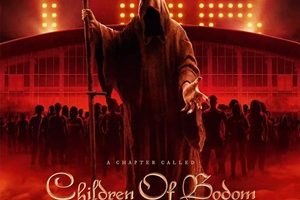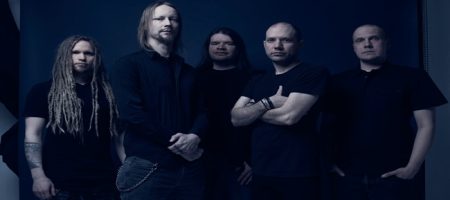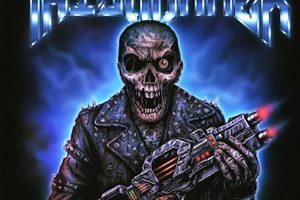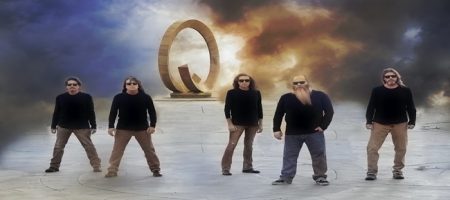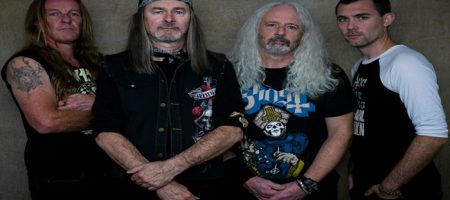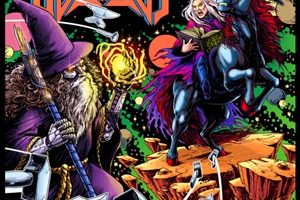Lost Society – Hold Up the Sky
Sunday, 18th September 2022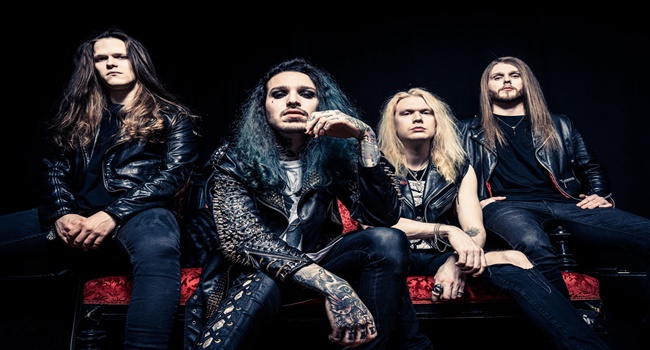
Younger musicians naturally progress as they gain more seasoning, experience, living out their dreams while soaking in the reality of it all. Although Finnish quartet Lost Society started in their teens as a thrash unit, by their third album Braindead listeners could hear broader expansion of influences across the modern, groove-oriented perspective in certain tracks. The current offering If the Sky Came Down certainly will be a record that may cause division due to the obvious melodic/modern-oriented elements, and yet others will still find killer hooks and memorable songwriting that contains the right amount of anger, aggression, and energy.
We reached out to guitarist/vocalist Samy Elbanna who was very excited to discuss any topic thrown at him. You’ll learn more about the personal experiences that come out in the lyrics for this record – how the band handles the evolution in sound and their viewpoints on this transformation, band chemistry, thoughts on special records by Iron Maiden, Children of Bodom, and Nine Inch Nails, plus the hopes of being road warriors to support the new album.
Dead Rhetoric: If the Sky Came Down is the fifth studio album for Lost Society. Considering your previous album No Absolution hit the streets at the start of 2020 just before the COVID-19 pandemic turned the music industry (and world) upside down, would you say you had more time to execute, plan, and pour through the recording/ songwriting this time around to be fully satisfied with the outcome?
Samy Elbanna: Absolutely. I think the biggest thing that we noticed is the fact that we got to polish the arrangements of the songs more than we’ve ever been able to before. We realized what a big difference that makes, actually the way that we wrote songs this time around, me and our producer and co-writer Joonas (Parkkonen), we do rough demos of songs, and we make a couple of versions of them. We then do pre-production sessions with the whole band, going through all the songs. The biggest change we had was to take those songs, put them aside, and listen to them over a couple of months to go through them again. When that goes down, you eliminate every single second of every single song that doesn’t make sense, polishing them to be the best that they can.
A lot of the songs on this record were made about five or six times, and they could change completely. One chorus could stay the same, but everything else could change around until things fit. That definitely made a big difference, and we had more time than ever to be able to do that.
Dead Rhetoric: Are you a music first guy, or do you work in tandem with the lyrics to get things right?
Elbanna: This time around, this was the first record for me where a lot of the lyrics came first. For anyone who has heard the record and reads the lyrics, it’s a very personal record for me. This record is basically a diary of the last one and a half years of my life. Everything that I’ve written down has been shit that has been happening to me. I found myself having a lot of one-liners, or it could be whole verse at a time, a whole chorus – we would build a song around that. Not to say that there weren’t a lot of songs that happened riff first and lyrics later, but I used to be a person that was more music first, lyrics later. I changed up the whole thing, and that was also one of the factors that made this record so different. In a good way.
Dead Rhetoric: Were there any particular songs that you think about now that took on the greatest transformation from the demo stage to what eventually came out on the record?
Elbanna: I have such a good recording on my cell phone of the day that we actually went to make backing tracks in the studio for our previous record, we recorded a piano demo Joonas and I of “112”. That was a year before we even started writing music for this new record. That song went through about five different versions. The final product and the single you hear now that version came about maybe two months before we hit the studio. That goes to show that you never know when that right version will hit you, but you will definitely feel that this is the right one.
Dead Rhetoric: Tell us about the video shoots for “112” and “Stitches” – were these obvious single choices, and how do you feel about the medium in gaining more traction through social media platforms, does it help keep Lost Society top of mind globally?
Elbanna: First of all, the video sessions were super good. It was an Estonian company that we have been working with called Vita Pictura. It was the first time we’ve worked with them; they are super young people in that company, and we are fairly young people as a band, I feel like they were one of the first companies that you could sense are really hungry, wanting to step up in doing music videos. We talked before the shoot; they know we love what we do and that we want to take things to the next level every time we release music. I feel that it was a very fruitful collaboration we had with them.
For just how it came about, I had these brief synopses for every song on the record, and for me especially I felt like “112” and “Stitches” were the first two songs off the record I wanted people to hear. This was before the record label even had the songs or the record. When we started exchanging emails with our A+R person from Nuclear Blast, they felt like those two songs would be great to start the game. From there on, everything was super natural. The reception for “112” was very good – at the end of the day it’s difficult to pinpoint just one song off of a record to give the fans of what is going to be happening, but not give away too much. On the other hand, you want to give them a feeling of what the elements are going to be like on the record. That song does give out a lot – the faster stuff, the big chorus, the cleans and growls. In hindsight it makes sense to have that out, even though our reasoning was totally different.
Honestly, I feel like social media has been very important to me, and we have been lucky as a band, we genuinely enjoy doing social media. Which is obviously something that not every band is as lucky – some bands are so against it, without even trying to make it look like themselves. They will have a perception that they are not going to do the social media thing, we are going to do it the school way. Social media in this day and age is more like what streaming was for the end of CD’s, or what CDs were for the end of cassettes. It’s going to feel evil, or something you don’t have to do, but at the end of the day in 2022, when you are up against literally millions of bands, you have to do whatever you can to make yourself try to stand out. It’s not like you are creating this fake persona, it’s all about the social media making you look like what you actually are yourselves.
That’s everything you will see on Tik Tok, Facebook, wherever. It’s going to look like myself and what I am as a person also. It is definitely an important thing. For the veteran bands like your Iron Maiden, Judas Priest, Kiss – they don’t have to do that as they have solidified their positions by becoming huge before social media became the integral part of this business. In the times that we are living in now, I do think social media is very important.
Dead Rhetoric: You mentioned earlier you put a year and a half of your life in diary form into these songs. Did you have any apprehension or worries about how that would translate for the fans?
Elbanna: In hindsight, especially I thought about it so many times how easily this whole thing happened. I think it’s because I’ve been practicing this for about twelve years. Music for me has always been the ultimate high – I put all my negative and positive emotions into this. In this situation, where I was faced with such trauma and such big crisis, if I can’t put it all into music, then what am I? This was the last thing I had in my life – I could trust that music is there for me and give all of myself without any shortcuts. I thought it could have been an issue, a worry, to be more susceptible to people giving me criticism, but it felt like the natural thing to do. I found myself in a place where I literally decided this record would be the last thing I was going to do, record this and that’s it. Now, writing and recording this record saved my life.
Dead Rhetoric: Obviously there’s been a stylistic shift in the band from the more thrash-oriented earlier albums to the groove/modern metal infusion that occurs today. How did the shift come about – and did you worry about any possible confusion or loss of followers? Is it a case of following your creative minds and heart to express yourselves in the way that is best for yourselves?
Elbanna: 100%. I’ve done a bunch of interviews and many times we discuss this, a change of styles. The way we all see it, it’s not a style change, it’s an evolution in music. For us, the whole thing dates back to when we started writing music and listening to music. We’ve always been a band that wears our influences on our sleeves heavily. When you are a thirteen-year-old kid and you listen to a lot of thrash music, it makes sense that is what you are going to be writing. When you pick up an instrument, that’s what will happen – the fast riffs, the young angst in the lyrics. I feel like it would be super naïve to think what would happen when you are thirteen you would be the exact same person ten years later, or fifteen years later.
Every single person will evolve in that sense. You’ll go through a lot of relationships, you’ll go through a lot of things that you will observe in the world, a lot of hardships as well as a lot of happiness. If you are the exact same person as you were ten years ago – it’s impossible, you can’t possibly be. With our music, it’s been that way that you’ll hear what we love to listen to. What we were doing with Fast Loud Death and Terror Hungry, we didn’t give much room to test out any melodies or any intricate songwriting. It was what we loved to do and loved to listen to. With Braindead, we slowed down a bit, more groove-oriented things. We had a long break before we released No Absolution, we pondered upon ourselves why we were denying ourselves what we actually are. If we have something we like, why aren’t we allowed to put it in our music just because people say we aren’t allowed to do that. With this record especially, we don’t give a fuck what people think, and we are going to do exactly what we want to do, sound like, and listen to.
If you take a playlist of what I listen to on a day-to-day basis, you will find Iron Maiden, Kiss, stuff like that. You will find also Lady Gaga, Nine Inch Nails, My Chemical Romance, Prodigy, everything. First and foremost, I am a music lover – I don’t like to put myself in any sort of boxes. It’s my anarchistic thing coming in – there is such a big paradox within metal music. This is the genre that you are supposed to play in where there are no rules. Then suddenly when you do something, you are put in these different boxes where if you do this music, you can’t listen to that kind of music. I’m here to tell everyone, yes you can – you can do whatever you want. You can literally do whatever you want. In thirty years you can look back and not have to say, I wish I would have taken those chances.
Dead Rhetoric: Entering your second decade as Lost Society, how would you describe the career arc and highlights of the band? Do you believe you have established yourselves fully with who you are and where you want to be?
Elbanna: No, I don’t think an artist is ever fully ready. That would take a lot of the joy out of this because we see ourselves on this big journey. We have 100% decided that this is what we are going to be doing for a living and do it as hard as we can. Everything we do is taking a big step forward, up this ladder. That’s the more natural way for me. I would hate to think that after we release one record, we think that we have peaked and that we can never do anything better than this. There is always an era, always a chapter, and you are going to have to do better than that the next time, otherwise there is no point in doing this.
We have gotten to do so many cool things even in this short career of ours. It took us about three years after the band was formed to play our first show in Japan, and that was insane. We got to do a North American tour with our heroes in Children of Bodom. We’ve done a bunch of European tours. We got to do a bunch of great things – I’ll never say that we never thought we would get to do them, I always thought in my mind that I will do them, it’s just a matter of time how long it takes. Even now after twelve years as a band, we are constantly growing, constantly learning things. This is the way of building a band in my eyes. I’m only 27 right now, I have a lifetime of building this thing and that’s what I’m going to be doing until the day I die.
Dead Rhetoric: When it comes to your own personal outlook at your instrument and abilities, where do you think you’ve seen the greatest growth or satisfaction – and where do you think you would like to spend more time and energy on to improve upon things, if there are area(s) of weakness?
Elbanna: The biggest thing I would say, just to my weakness as a person is, I have to learn through therapy to just enjoy these moments, enjoy the little victories we have. Being the creative director and the creative leader of this band, I have my eyes always set on something. When I do one thing, I’m already ready for the next thing. That’s something I’ve been working on. When you are on a huge festival on a huge stage, you don’t think about the next show, you just enjoy the moment that you’ve always dreamt of.
Instruments in general, the biggest evolvement from the last record to this record has definitely been within my vocals. It’s something I’ve really worked hard on. We’ve played guitar our whole lives, but singing isn’t something I’ve been doing my whole life. I practice, and being in a band where the guitarist, bassist, and drummer are world-class, you need to be a world-class singer. You can’t be the weakest link of this whole thing. This record, I spent hours and hours on end perfecting what I do. We are going forward all the time, and the next time we do a record it has to be better than that.
Dead Rhetoric: You mention in a recent video interview with the Mike James Rock Show that ‘music is the ultimate form of liberty’ and that ‘every record represents the emotions at that point in time’. Growing up, can you think of two or three bands (or records) that you fully embraced and influenced this freedom and outpouring of emotional connection at the right time in your life?
Elbanna: Yes, sir. Number one will always be The Number of the Beast, and the song is “The Prisoner”. That’s the first song I ever heard with distorted guitars. I was seven years old, my brother at the time made me this mix tape and that was the first song. When you are seven, going to school for the first time, and your parents are telling you to do this and this, when you hear a dude scream ‘I’m not a number, I am a free man’, you are onto something! That set me on the path where I still am to this day. That message is super close to my own heart. Another record would be from Children of Bodom – Hate Crew Deathroll. That was the extreme stuff I got into. You are so shameless putting together this form of melodic death metal, it’s so catchy. You can put together things that are super aggressive and create something still that people can sing along to. It was obvious when I got to know Alexi at a later stage, he loved 80’s music like Poison, Bon Jovi, it made full sense how he did this for his music too. And lastly, this will be difficult. At a later age, a band that really connected with me is Nine Inch Nails – Downward Spiral. It was an influence for this record. It was an adaptation, what was happening on that record adding my personal story.
Dead Rhetoric: Getting back on stages for festival shows this summer, do you gain a different perspective and energy from audiences that maybe was taken for granted pre-pandemic? Do you believe that this shift will hopefully help people embrace and appreciate live entertainment more than ever before?
Elbanna: 100%. That’s what I’ve been saying to everyone, every single interview I’ve had during the summer. Everyone is appreciating the situation so much more. You don’t see any bullshit in the crowd or leaving when other bands are playing. The unity is there, it’s more out there than ever before. It’s not just for the crowds, it’s with the bands as well. I feel like at some point, there were so many bands bitching about having to drive again, travel again. At the end of the day, we are doing something that we dreamt of when we were kids. We are so grateful that we get to do this. It served as a reminder how fragile this all can be, and it can be taken away from you at any second. There is a newfound appreciation towards all this, that’s for sure.
Dead Rhetoric: Now that Tapani Fagerström has been in the band for a couple of years, do you feel like the band chemistry is as strong as it’s ever been? What does he bring to the band with his playing and attitude that may be different than Ossi?
Elbanna: Definitely. For band chemistry, it’s amazing how Tapani has become. He’s my closest friend in the whole world, we talk every single day. When you have a new guy, it can be challenging. He is so like-minded as all of us, so there was never an issue. A lot of that is credited with the fact we’ve known each other almost as long as we knew each other previously. We got to know him back in 2013 when his former band (Santa Cruz) released their first record and we released our first record, we toured quite a bit together in Finland. I remember when this whole thing happened, we needed a new drummer, and there was one person in my mind. We never looked back.
His musical influences go so well with what we have. He has a rock and roll past mixed with thrash and modern metal past also. His drumming, he can jam around, improvise and that’s super important to us. He’s a metronome when you start playing metal music. The new record, it features the best drum work we’ve ever had. No way am I discrediting anything we’ve done in the past, but this music and these songs, it has the best drum arrangements that could be possible.
Dead Rhetoric: What would surprise people to learn about you away from Lost Society and who you are as a person?
Elbanna: Before this record, it would have been that I’m a complete trainwreck. Now that I am talking about it quite openly on this record, people will know that. You can have that whole tough guy attitude, that mask on you where everything is fine – and I was guilty of that on social media for so many years, portraying I was fully okay, but the thing behind that was so different. I am a sensitive dude, and that’s okay. You can never have enough of that in the metal scene, everyone expects you to be as hard as a rock. I’m just a dude, I love my family, and I am devastated when I don’t get to see them. That’s me, that is what Samy Elbanna is.
Dead Rhetoric: What’s on the agenda for Lost Society over the next twelve months for touring and promotion?
Elbanna: We will head to Europe and do a five-week tour with our friends in Blind Channel from Finland. We are doing about twenty-eight shows. We will come back to Finland and embark on our biggest Finnish tour, eleven dates around the country. We are focusing on next year as many tours as possible, hopefully coming back to North America for the first time in five years. I have told everyone in the team for our management, booking agency, please keep us on the road as much as possible. We’ve seen the inside of our houses enough; we are done with that (laughs).











